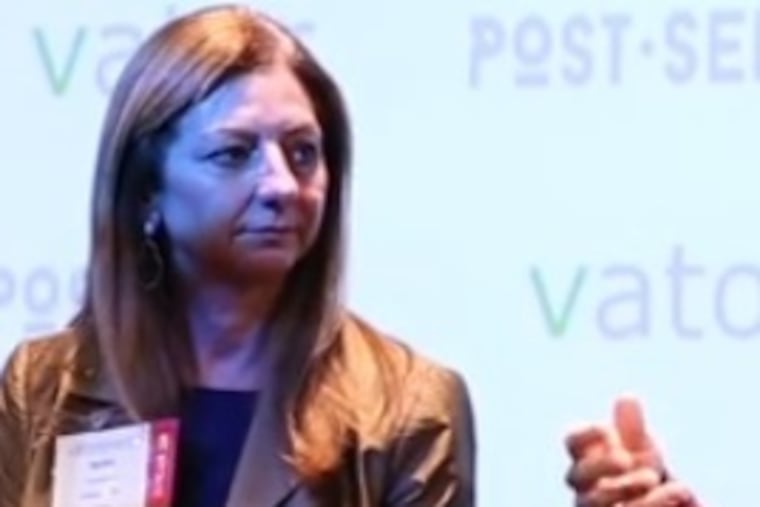Plea deal possible for Brenda Smith, Rittenhouse hedge fund manager accused of stealing $63 million
The Rittenhouse hedge fund thief is negotiating a plea agreement from prison. Victims and the authorities hope she tells them where the missing millions went.

Brenda Ann Smith, accused of stealing $63 million from investors through a Ponzi scheme, may be negotiating a deal with prosecutors, court documents show.
Smith claimed double-digit returns for three years in a row and said she raised more than $100 million. But about two-thirds of that money disappeared, according to federal prosecutors.
Smith was arrested at her Rittenhouse Square condo Aug. 27 and charged with stealing at least $63 million. Last month, she wrote a letter asking the Securities and Exchange Commission to modify its freeze on her assets so she could pay for a lawyer. The SEC also froze two accounts of alleged accomplice Renato Escobar Iregui and more than two dozen other bank accounts.
“I implore the court to review these circumstances,” she said in a letter filed with the courts Dec. 10 and dated Nov. 29. “The freeze of all assets does not allow due process in these matters. I do not have access to resources necessary to defend myself.”
A letter signed by her public defender, Kevin Carlucci of the Department of Justice, wrote that defense counsel needed time “to conduct plea negotiations and attempt to finalize a plea agreement.”
Smith allegedly used her legitimate brokerage firm, CV Brokerage, as part of the investment pitch for her fake hedge fund, claiming she had a special edge with a trading strategy called “dividend recapture.”
As part of a potential plea deal, Smith could name her accomplices and help locate the missing millions of dollars.
Authorities allege she operated the phony hedge fund under several names — Bristol Advisors, Broad Reach Capital, and CV International.
From February 2016, Smith, now 59, ran a Conshohocken-based network of investment companies, but she was the only employee of each company for most of that period. The funds “were essentially her alter egos,” according to court papers.
In a classic Ponzi scheme, Smith never put to work most of the $100 million, and instead wired new funds to prior investors, coconspirators, and outside companies, according to the U.S. Attorney’s Office in Newark, N.J., which is prosecuting her criminally.
Smith is being held in the Essex County jail in New Jersey. The county facility has a contract to hold federal prisoners.
Before her arrest, Smith purchased a second passport from Dominica. She is considered a flight risk.
To outsiders, Smith was a successful woman in a male-dominated finance world. Educated at Louisiana State University, with an accounting degree, Smith spoke with authority and a dose of Southern charm. She enlisted a number of well-known Philadelphia business figures to raise money for her fund, and compiled an investor list that included the Who’s Who of the region.
Missing millions
Smith’s largest investor, a firm in Montreal, filed suit in U.S. District Court in the Eastern District of Pennsylvania in September, alleging she stole $46 million. Among those accused in Canadian investor Surefire Dividend’s civil lawsuit are Smith, auditor Sanville & Co., fund administrator Nottingham, and alleged coconspirator Iregui, who vouched for her strategy and helped persuade Surefire to invest roughly $46 million.
Federal investigators are also looking at Smith’s longtime associate George Heckler, whose hedge funds Cassatt Short-Term Trading and CV Fund were clients of an accounting firm where she worked.
Heckler is cooperating fully with federal agencies, according to his lawyer, Lawrence McMichael with Dilworth Paxson. George Heckler is the son of Howard Heckler, onetime mayor of Hatfield Borough.
Heckler, Smith, and her early investment partner Mark Carrow, currently managing partner at the Citrin Cooperman accounting firm, were business associates who had known each other for at least a decade.
Carrow was also an early investor in Smith’s hedge fund. Smith and Carrow dated at one point and owned property together at the New Jersey Shore, records show, although she signed away her ownership rights in 2014. An entity called Ardleigh Partners, co-owned by Carrow, invested about $652,000 in capital with Smith’s hedge fund, according to a 2016 investor list shared with The Inquirer.
Heckler sometimes worked out of Smith’s offices in West Conshohocken. He now blames Smith for his inability to pay back investors, according to a Sept. 12 letter to his clients signed by his lawyer. Carrow signed Heckler’s formation documents for the Cassatt Short-Term Trading hedge fund in 2008. Heckler’s fund filed to raise $50 million, with a $1 million minimum investment, and Carrow was listed as chief executive, according to SEC filings.
An attorney for Heckler said investors with his fund can’t get their money out.
“No money is going in or out of George’s funds currently, until the SEC investigation is concluded,” said McMichael, Heckler’s attorney.
“Mark Carrow was one of the original partners in George’s fund, but he was more on the front end, more involved in obtaining investors,” McMichael said.
Carrow’s attorney, Gavin Lentz of Bochetto & Lentz, disputed that, issuing a statement via email: “He expressly denies making any recommendation" to invest in Smith or with Heckler. "That information is 100% incorrect. Nor did Mark give any recommendations to George Heckler.”